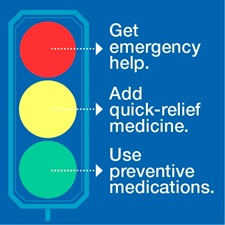Recent Posts
Create an asthma action plan for your child

Asthma is one of the most common chronic conditions of childhood. It affects about 6 million children and adolescents in the U.S. This condition causes the lungs and airways to become inflamed when exposed to certain triggers, such as environmental allergens, exercise, weather changes or catching a respiratory infection.
Childhood asthma can cause bothersome daily symptoms that interfere with play, sports, school and sleep. It's a primary reason students school days, and it can be dangerous if unmanaged.
If your child has asthma, developing an asthma action plan is helpful. You can't be with your child all the time, so outlining a plan ensures that key adults in your child's life understand the condition and what to do in an emergency. Preventing asthma symptoms is better than treating them after they begin, and symptoms are much easier to manage if you start treatment early. With good asthma management, your child should be able to live a normal, active life.
Challenges kids with asthma face include:
- Hard to avoid asthma triggers in different environments
Children can more easily avoid asthma triggers while at home. Triggers are environmental, allergy or exercise situations that start an asthma episode. Children in school or other locations can't control their environment as easily and could be exposed to more asthma triggers. - Viral illnesses
More viral illnesses go around when children are around other people. especially in school. Viral illness can trigger exacerbations, and these illnesses are more common during the school year and in the winter. - Seasonal allergies
Autumn brings seasonal allergies, specifically to mold and ragweed pollen. Allergies can trigger more asthma episodes for children. - New activities and adults
Children may start new sports throughout the year and or have a new coach who does not know how to help a child avoid asthma triggers.
Asthma action plan
An asthma action plan provides information and instruction on properly managing and responding to the condition. People with asthma should complete the plan with help from family members and their health care team.
For school-age children, an asthma action plan should include:
- Emergency contact name and telephone number
- Health care team contact and telephone number
- Peak flow values
- Medication names, dosing and frequency
- Steps to take during an asthma episode
- Outline of when to seek emergency medical care
An asthma action plan uses a traffic light format to categorize asthma symptoms:

- Green
When in this section, your child is not coughing or wheezing, and is able to sleep through the night and play without shortness of breath. You should continue to use preventive medications. - Yellow
Your child enters this section if showing signs of a cold, experiencing some symptoms or was exposed to a known trigger. This section outlines additional medications, such as rescue inhalers, and when to call the child's health care team. - Red
Your child is in this section when asthma symptoms are worsening quickly and immediate emergency medical care is required.
A thorough plan ensures that all adults in your child's life, from the school nurse and bus driver to coach and grandparent, understand their unique experience with asthma and are on the same page with managing and responding to asthma episodes.
Each person's experience with asthma is unique. Make sure your child has their own asthma action plan, rather than following someone else's or only telling the school nurse that your child has an inhaler. Take steps to complete and distribute the plan so your child can minimize episodes and have the best experience in daily activities.
John Wheeler Jr., M.D., sees patients in Allergy & Asthma in La Crosse, Wisconsin.




